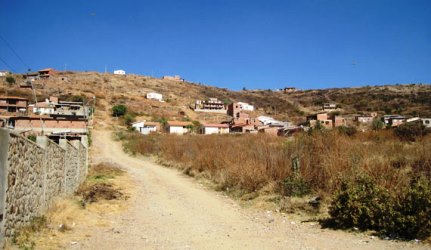
 The cooperative community, Hábitat Para la Mujer Comunidad María Auxiliadora (CMA), lies on the outskirts of Cochabamba, Bolivia. This community of collectively owned properties was formed to help single mothers who were escaping unbearable living conditions entangled in domestic abuse. CMA is based off a model of collective ownership that emphasizes the role of women who are trained in construction skills, as well as community leadership, activism and negotiation with public authorities.
The cooperative community, Hábitat Para la Mujer Comunidad María Auxiliadora (CMA), lies on the outskirts of Cochabamba, Bolivia. This community of collectively owned properties was formed to help single mothers who were escaping unbearable living conditions entangled in domestic abuse. CMA is based off a model of collective ownership that emphasizes the role of women who are trained in construction skills, as well as community leadership, activism and negotiation with public authorities.
CMA has grown to over 400 families. It gives a voice and a support network to those traditionally disadvantaged. CMA has established basic services such as potable water, reliable electricity, recreation spaces, and a sewer system. CMA optimizes communal open space and uses affordable green construction. The subsistence of this sustainable self-management model is threatened because of the collective nature of the land’s property title.
When CMA was founded in 1999, there was no legal precedent for urban collective property rights within Bolivia. To solve the issue, CMA founders acquired the land title under one person’s name. Fourteen years later this seemingly simple solution is jeopardizing the community’s existence. Efforts to remedy the land title status are being met with reluctance, undermining the strong social fabric CMA created for some of Bolvia’s disenfranchised.
CMA is currently lobbying the Municipality of Cochabamba to achieve legal incorporation and be recognized as a legally incorporated entity. Under the auspices of the ECPA Urban Planning Initiative, the American Planning Association (APA) is providing CMA with tools to improve its political messaging and to lobby more effectively. For example, APA is funding the construction of The Leadership School and Training Facility. This facility will provide capacity building for members to convey their community’s social function to government authorities. In addition, APA sent political messaging specialist, Nancy Bocskor, to assist CMA’s mission statement.
These tools will help CMA achieve legal recognition as a community and, in the long run, establish the social infrastructure that is needed for its members to run for, and win, public office in local agencies. ECPA and APA will continue to support CMA by means of ongoing technical visits that will help formalize a curriculum in political messaging and lobbying efforts.
Photo credits: American Planning Association
 View Map
View Map